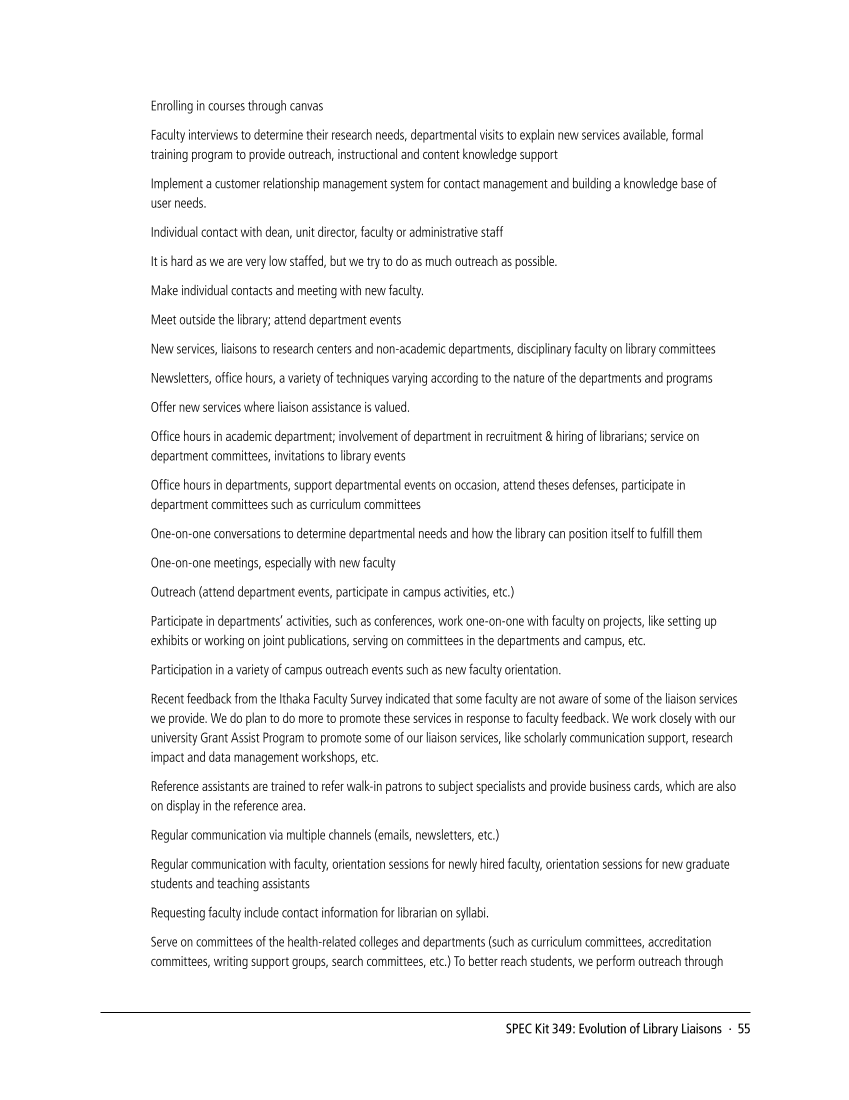SPEC Kit 349: Evolution of Library Liaisons · 55
Enrolling in courses through canvas
Faculty interviews to determine their research needs, departmental visits to explain new services available, formal
training program to provide outreach, instructional and content knowledge support
Implement a customer relationship management system for contact management and building a knowledge base of
user needs.
Individual contact with dean, unit director, faculty or administrative staff
It is hard as we are very low staffed, but we try to do as much outreach as possible.
Make individual contacts and meeting with new faculty.
Meet outside the library attend department events
New services, liaisons to research centers and non-academic departments, disciplinary faculty on library committees
Newsletters, office hours, a variety of techniques varying according to the nature of the departments and programs
Offer new services where liaison assistance is valued.
Office hours in academic department involvement of department in recruitment &hiring of librarians service on
department committees, invitations to library events
Office hours in departments, support departmental events on occasion, attend theses defenses, participate in
department committees such as curriculum committees
One-on-one conversations to determine departmental needs and how the library can position itself to fulfill them
One-on-one meetings, especially with new faculty
Outreach (attend department events, participate in campus activities, etc.)
Participate in departments’ activities, such as conferences, work one-on-one with faculty on projects, like setting up
exhibits or working on joint publications, serving on committees in the departments and campus, etc.
Participation in a variety of campus outreach events such as new faculty orientation.
Recent feedback from the Ithaka Faculty Survey indicated that some faculty are not aware of some of the liaison services
we provide. We do plan to do more to promote these services in response to faculty feedback. We work closely with our
university Grant Assist Program to promote some of our liaison services, like scholarly communication support, research
impact and data management workshops, etc.
Reference assistants are trained to refer walk-in patrons to subject specialists and provide business cards, which are also
on display in the reference area.
Regular communication via multiple channels (emails, newsletters, etc.)
Regular communication with faculty, orientation sessions for newly hired faculty, orientation sessions for new graduate
students and teaching assistants
Requesting faculty include contact information for librarian on syllabi.
Serve on committees of the health-related colleges and departments (such as curriculum committees, accreditation
committees, writing support groups, search committees, etc.) To better reach students, we perform outreach through
Enrolling in courses through canvas
Faculty interviews to determine their research needs, departmental visits to explain new services available, formal
training program to provide outreach, instructional and content knowledge support
Implement a customer relationship management system for contact management and building a knowledge base of
user needs.
Individual contact with dean, unit director, faculty or administrative staff
It is hard as we are very low staffed, but we try to do as much outreach as possible.
Make individual contacts and meeting with new faculty.
Meet outside the library attend department events
New services, liaisons to research centers and non-academic departments, disciplinary faculty on library committees
Newsletters, office hours, a variety of techniques varying according to the nature of the departments and programs
Offer new services where liaison assistance is valued.
Office hours in academic department involvement of department in recruitment &hiring of librarians service on
department committees, invitations to library events
Office hours in departments, support departmental events on occasion, attend theses defenses, participate in
department committees such as curriculum committees
One-on-one conversations to determine departmental needs and how the library can position itself to fulfill them
One-on-one meetings, especially with new faculty
Outreach (attend department events, participate in campus activities, etc.)
Participate in departments’ activities, such as conferences, work one-on-one with faculty on projects, like setting up
exhibits or working on joint publications, serving on committees in the departments and campus, etc.
Participation in a variety of campus outreach events such as new faculty orientation.
Recent feedback from the Ithaka Faculty Survey indicated that some faculty are not aware of some of the liaison services
we provide. We do plan to do more to promote these services in response to faculty feedback. We work closely with our
university Grant Assist Program to promote some of our liaison services, like scholarly communication support, research
impact and data management workshops, etc.
Reference assistants are trained to refer walk-in patrons to subject specialists and provide business cards, which are also
on display in the reference area.
Regular communication via multiple channels (emails, newsletters, etc.)
Regular communication with faculty, orientation sessions for newly hired faculty, orientation sessions for new graduate
students and teaching assistants
Requesting faculty include contact information for librarian on syllabi.
Serve on committees of the health-related colleges and departments (such as curriculum committees, accreditation
committees, writing support groups, search committees, etc.) To better reach students, we perform outreach through












































































































































































































